Your cart is currently empty!
Ethical Decision-Making: Choosing What’s Right, Even When It’s Hard
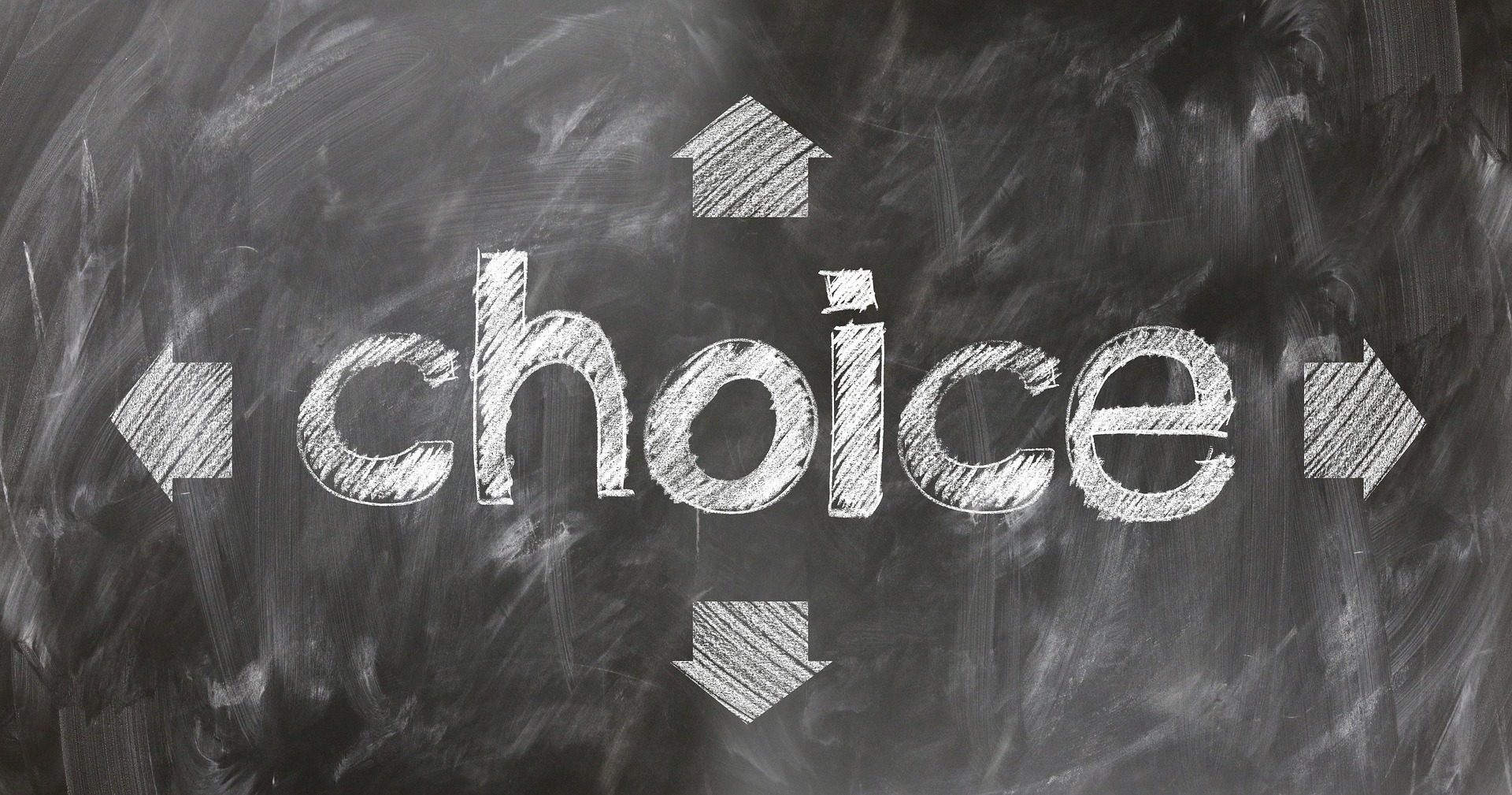
We live in an age where every decision is magnified, not just by its immediate consequences, but by how it shapes perception over time. In leadership, business, and life, your ethical choices are the threads that weave together your reputation, your influence, and your legacy.
The true test of a leader’s character isn’t in the easy moments when doing the right thing aligns perfectly with personal gain. It’s in the moments when doing what’s right is inconvenient, unpopular, or costly. That’s when values are tested—and when the foundation of your brand, career, and personal integrity is either strengthened or eroded.
Ethical decision-making is not just about following laws or avoiding scandal. Those are the bare minimums. It’s about having a moral compass so steady that, even under pressure, it points to the same north. It’s about aligning your choices with your values even when it’s uncomfortable, inconvenient, or outright painful in the short term. And it’s about leading in such a way that others are inspired to do the same.
In this in-depth exploration, we’ll break ethical decision-making down into three critical questions that should guide you in every high-stakes situation:
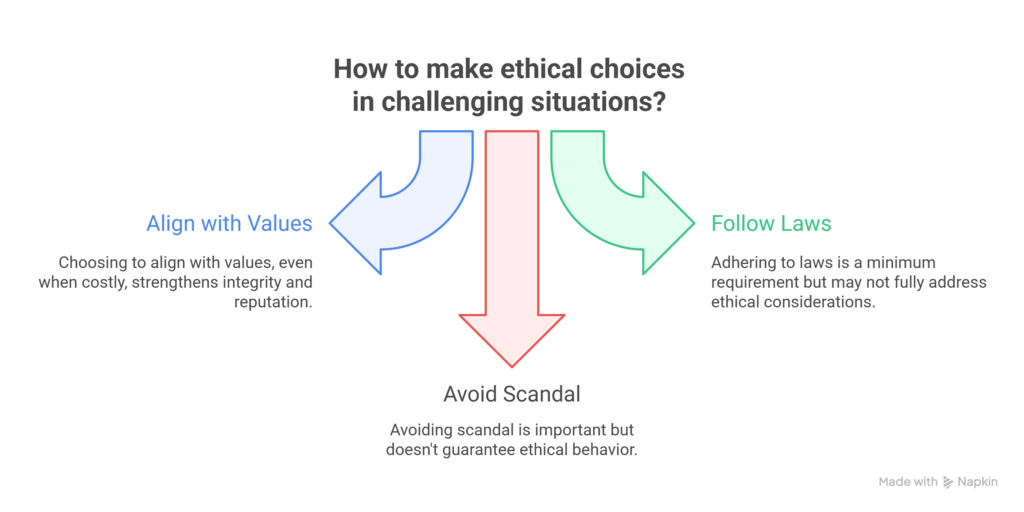
- Will you make choices aligned with your values, even if costly?
- How will ethics shape your reputation and brand?
- Are you ready to lead by example in integrity?
But we won’t just stop at theory—we’ll examine case studies, explore psychological traps, build practical decision-making frameworks, and look at the long-term ripple effects of ethics in leadership.
1. Will You Make Choices Aligned With Your Values, Even if Costly?
Anyone can follow their values when it costs nothing. The real test comes when those values run headlong into financial loss, personal risk, or public criticism.
Let’s be brutally honest—doing the ethical thing can sting in the moment. You might lose a deal. You might delay a project. You might anger people whose approval you want. And if you’re in business, you might watch your competitors pull ahead because they took shortcuts you refused to take.
The Hidden Cost of Compromise
While the immediate cost of ethical action is visible, the cost of unethical compromise is quieter but far more dangerous. A single compromise often leads to another, because once you’ve crossed your own boundaries “just this once,” the psychological barrier to doing it again becomes much weaker. This is known in behavioral ethics as the slippery slope effect—small moral lapses pave the way for larger ones.
Soon, you’re not making one big ethical decision—you’re making dozens of tiny compromises that add up to a version of yourself you never intended to become.
Case Study: The Costly but Correct Choice
In 2010, the outdoor clothing company Patagonia made a decision that cost them millions: they launched the “Don’t Buy This Jacket” campaign, encouraging customers to think twice before purchasing new gear and to repair or reuse instead. The short-term result? Lower immediate sales. The long-term result? Unshakable brand loyalty, industry respect, and a reputation as a company that actually lives its environmental values.
They paid a price, but the payoff came in the form of trust—a resource far more valuable than a single sales spike.
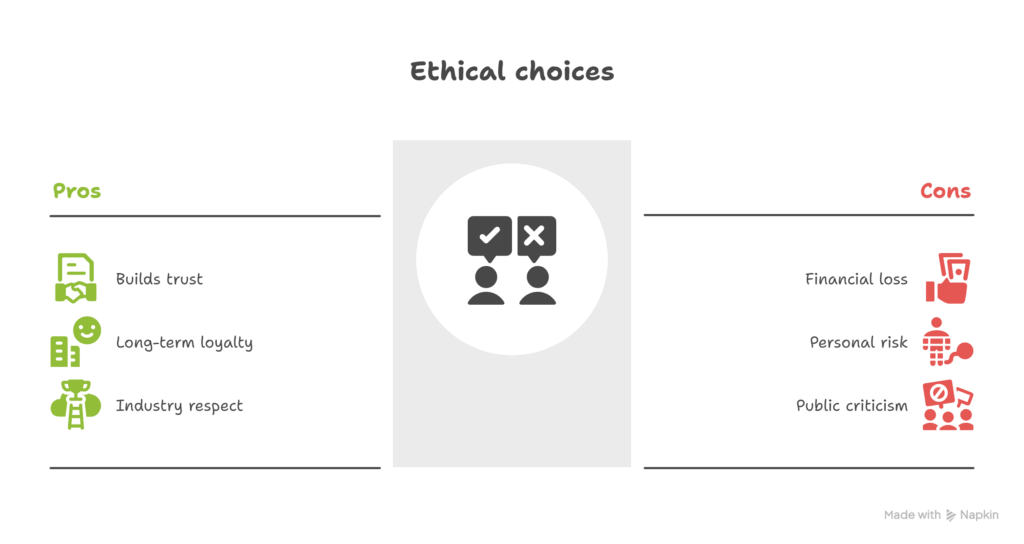
- Will you make choices aligned with your values, even if costly?
- How will ethics shape your reputation and brand?
- Are you ready to lead by example in integrity?
But we won’t just stop at theory—we’ll examine case studies, explore psychological traps, build practical decision-making frameworks, and look at the long-term ripple effects of ethics in leadership.
1. Will You Make Choices Aligned With Your Values, Even if Costly?
Anyone can follow their values when it costs nothing. The real test comes when those values run headlong into financial loss, personal risk, or public criticism.
Let’s be brutally honest—doing the ethical thing can sting in the moment. You might lose a deal. You might delay a project. You might anger people whose approval you want. And if you’re in business, you might watch your competitors pull ahead because they took shortcuts you refused to take.
The Hidden Cost of Compromise
While the immediate cost of ethical action is visible, the cost of unethical compromise is quieter but far more dangerous. A single compromise often leads to another, because once you’ve crossed your own boundaries “just this once,” the psychological barrier to doing it again becomes much weaker. This is known in behavioral ethics as the slippery slope effect—small moral lapses pave the way for larger ones.
Soon, you’re not making one big ethical decision—you’re making dozens of tiny compromises that add up to a version of yourself you never intended to become.
Case Study: The Costly but Correct Choice
In 2010, the outdoor clothing company Patagonia made a decision that cost them millions: they launched the “Don’t Buy This Jacket” campaign, encouraging customers to think twice before purchasing new gear and to repair or reuse instead. The short-term result? Lower immediate sales. The long-term result? Unshakable brand loyalty, industry respect, and a reputation as a company that actually lives its environmental values.
They paid a price, but the payoff came in the form of trust—a resource far more valuable than a single sales spike.
2. How Will Ethics Shape Your Reputation and Brand?
Your reputation is essentially the public’s memory of how you make decisions. Every choice—whether internal, like how you treat employees, or external, like how you handle customers—contributes to the story people tell about you.
Ethics isn’t just an internal compass—it’s a brand builder. A brand grounded in integrity doesn’t just survive crises better; it often emerges from them stronger because people already believe the best about you.
The Fragile Nature of Reputation
- Takes years to build: Ethical consistency over time creates credibility.
- Can vanish in a day: One public ethical failure—especially in the age of instant social media—can undo decades of good work.
- Impacts opportunities: Investors, partners, and customers choose to engage (or not) based on perceived trustworthiness.
Think of Johnson & Johnson’s handling of the 1982 Tylenol poisoning crisis. The company immediately pulled 31 million bottles from shelves, a decision that cost over $100 million. They introduced tamper-proof packaging—something no regulation required at the time. That choice shaped their reputation for decades as a company that prioritizes safety over profit.
Now contrast that with companies like Volkswagen during the emissions scandal—where an unethical choice to cheat emissions tests caused billions in losses, executive resignations, lawsuits, and long-term brand damage.
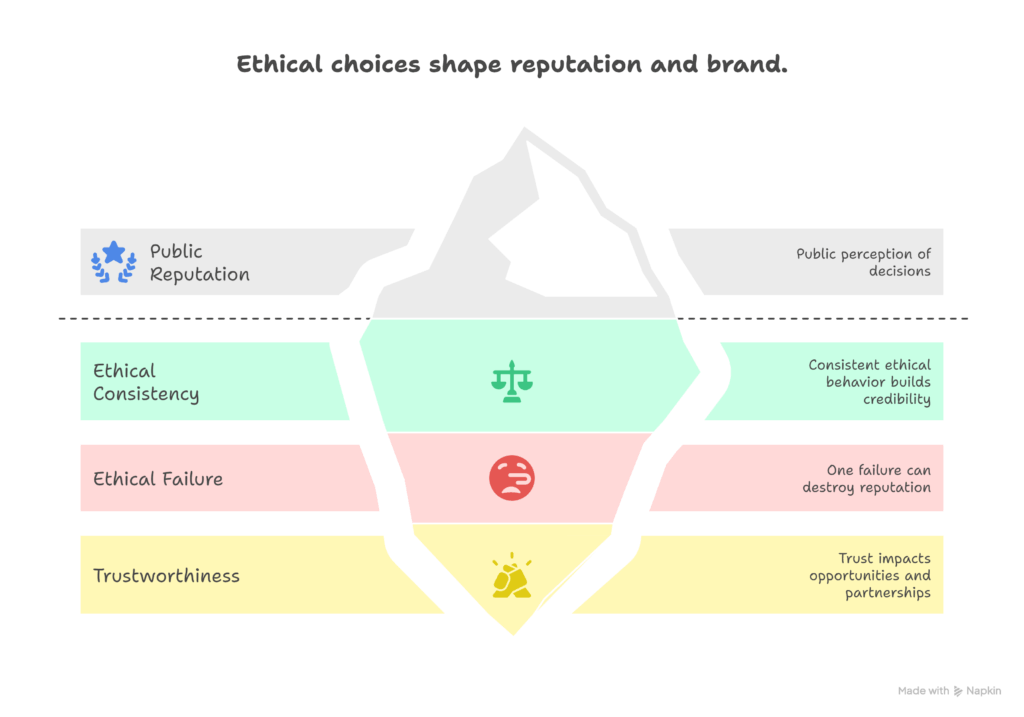
- Will you make choices aligned with your values, even if costly?
- How will ethics shape your reputation and brand?
- Are you ready to lead by example in integrity?
But we won’t just stop at theory—we’ll examine case studies, explore psychological traps, build practical decision-making frameworks, and look at the long-term ripple effects of ethics in leadership.
1. Will You Make Choices Aligned With Your Values, Even if Costly?
Anyone can follow their values when it costs nothing. The real test comes when those values run headlong into financial loss, personal risk, or public criticism.
Let’s be brutally honest—doing the ethical thing can sting in the moment. You might lose a deal. You might delay a project. You might anger people whose approval you want. And if you’re in business, you might watch your competitors pull ahead because they took shortcuts you refused to take.
The Hidden Cost of Compromise
While the immediate cost of ethical action is visible, the cost of unethical compromise is quieter but far more dangerous. A single compromise often leads to another, because once you’ve crossed your own boundaries “just this once,” the psychological barrier to doing it again becomes much weaker. This is known in behavioral ethics as the slippery slope effect—small moral lapses pave the way for larger ones.
Soon, you’re not making one big ethical decision—you’re making dozens of tiny compromises that add up to a version of yourself you never intended to become.
Case Study: The Costly but Correct Choice
In 2010, the outdoor clothing company Patagonia made a decision that cost them millions: they launched the “Don’t Buy This Jacket” campaign, encouraging customers to think twice before purchasing new gear and to repair or reuse instead. The short-term result? Lower immediate sales. The long-term result? Unshakable brand loyalty, industry respect, and a reputation as a company that actually lives its environmental values.
They paid a price, but the payoff came in the form of trust—a resource far more valuable than a single sales spike.
2. How Will Ethics Shape Your Reputation and Brand?
Your reputation is essentially the public’s memory of how you make decisions. Every choice—whether internal, like how you treat employees, or external, like how you handle customers—contributes to the story people tell about you.
Ethics isn’t just an internal compass—it’s a brand builder. A brand grounded in integrity doesn’t just survive crises better; it often emerges from them stronger because people already believe the best about you.
The Fragile Nature of Reputation
- Takes years to build: Ethical consistency over time creates credibility.
- Can vanish in a day: One public ethical failure—especially in the age of instant social media—can undo decades of good work.
- Impacts opportunities: Investors, partners, and customers choose to engage (or not) based on perceived trustworthiness.
Think of Johnson & Johnson’s handling of the 1982 Tylenol poisoning crisis. The company immediately pulled 31 million bottles from shelves, a decision that cost over $100 million. They introduced tamper-proof packaging—something no regulation required at the time. That choice shaped their reputation for decades as a company that prioritizes safety over profit.
Now contrast that with companies like Volkswagen during the emissions scandal—where an unethical choice to cheat emissions tests caused billions in losses, executive resignations, lawsuits, and long-term brand damage.
3. Are You Ready to Lead by Example in Integrity?
If ethics is the foundation, integrity is the structure you build on it. And leadership is the loudest form of integrity.
When you’re in a position of influence, every decision—no matter how small—sends a signal. Your team, your customers, and your stakeholders are always watching. If you cut corners, they will notice. If you stand firm in your principles, they will notice that too.
Integrity is Contagious
When leaders act with integrity:
- Employees are more likely to report problems early instead of hiding them.
- Team morale increases because people feel aligned with a greater purpose.
- The organization naturally attracts talent who share the same values.
When Integrity Slips
A single lapse from leadership can normalize unethical behaviour throughout the organization. A leader who ignores harassment claims, bends accounting rules, or turns a blind eye to shady supplier practices is essentially giving permission for everyone else to do the same. Over time, this corrodes the culture, leading to higher turnover, lower productivity, and ultimately, public scandal.
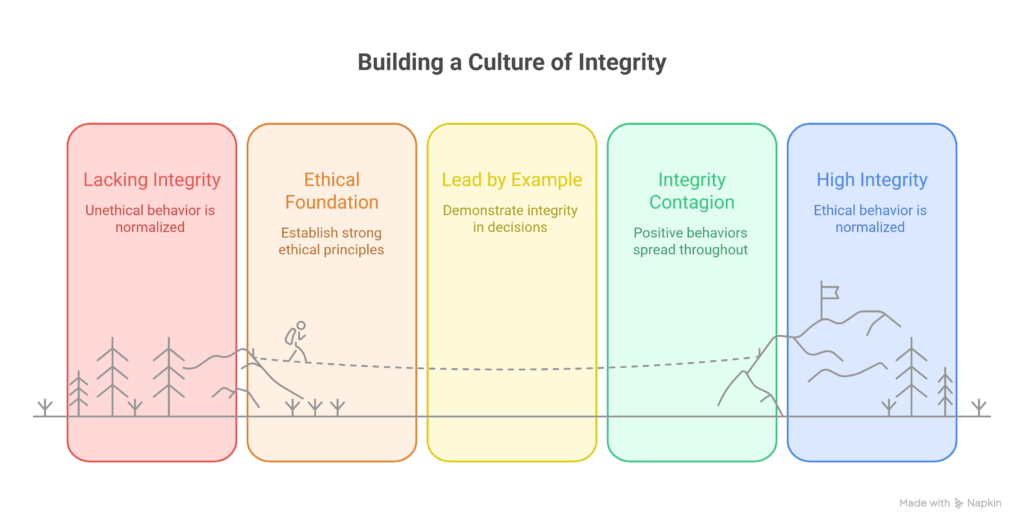
- Will you make choices aligned with your values, even if costly?
- How will ethics shape your reputation and brand?
- Are you ready to lead by example in integrity?
But we won’t just stop at theory—we’ll examine case studies, explore psychological traps, build practical decision-making frameworks, and look at the long-term ripple effects of ethics in leadership.
1. Will You Make Choices Aligned With Your Values, Even if Costly?
Anyone can follow their values when it costs nothing. The real test comes when those values run headlong into financial loss, personal risk, or public criticism.
Let’s be brutally honest—doing the ethical thing can sting in the moment. You might lose a deal. You might delay a project. You might anger people whose approval you want. And if you’re in business, you might watch your competitors pull ahead because they took shortcuts you refused to take.
The Hidden Cost of Compromise
While the immediate cost of ethical action is visible, the cost of unethical compromise is quieter but far more dangerous. A single compromise often leads to another, because once you’ve crossed your own boundaries “just this once,” the psychological barrier to doing it again becomes much weaker. This is known in behavioral ethics as the slippery slope effect—small moral lapses pave the way for larger ones.
Soon, you’re not making one big ethical decision—you’re making dozens of tiny compromises that add up to a version of yourself you never intended to become.
Case Study: The Costly but Correct Choice
In 2010, the outdoor clothing company Patagonia made a decision that cost them millions: they launched the “Don’t Buy This Jacket” campaign, encouraging customers to think twice before purchasing new gear and to repair or reuse instead. The short-term result? Lower immediate sales. The long-term result? Unshakable brand loyalty, industry respect, and a reputation as a company that actually lives its environmental values.
They paid a price, but the payoff came in the form of trust—a resource far more valuable than a single sales spike.
2. How Will Ethics Shape Your Reputation and Brand?
Your reputation is essentially the public’s memory of how you make decisions. Every choice—whether internal, like how you treat employees, or external, like how you handle customers—contributes to the story people tell about you.
Ethics isn’t just an internal compass—it’s a brand builder. A brand grounded in integrity doesn’t just survive crises better; it often emerges from them stronger because people already believe the best about you.
The Fragile Nature of Reputation
- Takes years to build: Ethical consistency over time creates credibility.
- Can vanish in a day: One public ethical failure—especially in the age of instant social media—can undo decades of good work.
- Impacts opportunities: Investors, partners, and customers choose to engage (or not) based on perceived trustworthiness.
Think of Johnson & Johnson’s handling of the 1982 Tylenol poisoning crisis. The company immediately pulled 31 million bottles from shelves, a decision that cost over $100 million. They introduced tamper-proof packaging—something no regulation required at the time. That choice shaped their reputation for decades as a company that prioritizes safety over profit.
Now contrast that with companies like Volkswagen during the emissions scandal—where an unethical choice to cheat emissions tests caused billions in losses, executive resignations, lawsuits, and long-term brand damage.
3. Are You Ready to Lead by Example in Integrity?
If ethics is the foundation, integrity is the structure you build on it. And leadership is the loudest form of integrity.
When you’re in a position of influence, every decision—no matter how small—sends a signal. Your team, your customers, and your stakeholders are always watching. If you cut corners, they will notice. If you stand firm in your principles, they will notice that too.
Integrity is Contagious
When leaders act with integrity:
- Employees are more likely to report problems early instead of hiding them.
- Team morale increases because people feel aligned with a greater purpose.
- The organization naturally attracts talent who share the same values.
When Integrity Slips
A single lapse from leadership can normalize unethical behavior throughout the organization. A leader who ignores harassment claims, bends accounting rules, or turns a blind eye to shady supplier practices is essentially giving permission for everyone else to do the same. Over time, this corrodes the culture, leading to higher turnover, lower productivity, and ultimately, public scandal.
The Psychological Traps That Lead to Unethical Decisions
Even good people with strong values can fall into unethical choices without realizing it. Here are the biggest traps:
- The “Everyone Does It” Justification – Comparing your behaviour to industry norms instead of your own values.
- Incrementalism – Slipping into small compromises that add up over time.
- Outcome Bias – Believing a good result justifies a questionable method.
- Overconfidence in Morality – Assuming “I would never do that,” and failing to see warning signs in your own decisions.
- Pressure Cooker Thinking – Making snap decisions under stress without pausing for ethical reflection.
Building Your Ethical Decision-Making Framework
To avoid falling into these traps, create a repeatable process:
- Clarify Your Core Values
Write down the 3–5 principles that you refuse to compromise, no matter the situation. - Define Your Non-Negotiables
Identify the lines you will not cross—even for a lucrative deal or personal gain. - Ask the Public Test Question
If this decision was made public tomorrow, would I still be proud of it? - Consider the Ripple Effect
How will this choice influence your future self, your team, your brand, and even your industry? - Seek Perspective
Consult with someone outside the immediate situation who can challenge your thinking without bias.
Real-World Examples of Ethics at Scale
- Unilever has publicly committed to sustainable sourcing, sometimes sacrificing cheaper supplier deals in favor of environmental and labor standards.
- Ben & Jerry’s regularly takes public stances on social justice issues, even at the risk of alienating some customers, because those causes align with their core values.
- The Body Shop pioneered cruelty-free cosmetics decades before it became an industry trend, absorbing higher R&D costs in the process.
Reflection Exercise: Your Ethical Pressure Test
Take a sheet of paper and write down:
- The last 3 difficult decisions you made.
- Whether those decisions aligned fully with your values.
- What pressures influenced your choice.
- How you would feel if each decision was front-page news tomorrow.
Patterns will emerge. If you notice rationalizations or compromises, that’s not a sign of failure—it’s a sign of where to strengthen your ethical framework.
Final Reflection: Ethics as a Legacy
In the moment, ethical decisions often feel like sacrifices. But over the span of a career—or a lifetime—they become the very foundation of your identity. People will forget many things about you: your job titles, your quarterly numbers, your industry awards. But they will remember how you treated others, how you responded under pressure, and whether your actions matched your words.
Ethics, ultimately, is not just about doing what is right for the moment—it’s about building a legacy you can live with.
So the next time you face a high-stakes choice, slow down and ask yourself:

- – Am I making this decision from fear, pressure, or alignment with my principles?
- – Would I be proud if this became public tomorrow?
- – What precedent am I setting for the next time I’m in this situation?
If your answers align with your values, you’re not just making the right choice—you’re building the kind of legacy that endures long after the decision is made.
Leave a Reply